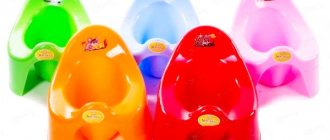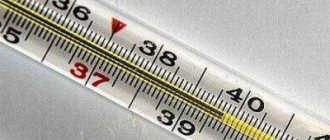Until the moment of birth, children have a different blood circulation, and the intestines are generally sterile. After birth, the child’s body begins to work like an adult, which at this stage is difficult and unusual for him.
The baby cannot speak or clearly express its discomfort and cries a lot in the first three months. The color of a newborn’s stool is an objective factor by which parents can judge the baby’s health status.
Bowel function in the first months of life
The children's organ performs standard functions - it participates in the digestion of food, promotes the absorption of nutrients into the blood and removes unnecessary products. You can evaluate the quality of its work by the parameters of stool - consistency, color, smell, presence of inclusions. In addition, changes in secretions are used to judge the functioning of some other organs and systems.
Metabolic products begin to accumulate in the mother's womb and are released after childbirth, so the baby's first stool looks unusual. Intestinal sterility and weak enzymatic function lead to the fact that after meconium, stool does not have a strong odor, and its color is expressed by a grayish tint.
As beneficial bacteria colonize and digestive ability improves, the stool acquires a distinct unpleasant odor and turns yellow-brown. The relationship between the functioning of the gastrointestinal tract and the nature of the discharge is obvious and allows us to assess the health and needs of the newborn.
The frequency of bowel movements in infancy occurs up to 12 times, regardless of the type of feeding. This allows parents to notice a problem in time if it appears. At the same time, young mothers must adhere to the “golden mean”, that is, understand in which cases it is worth worrying and when there is no danger.
And for this you need a basic understanding of what normal feces look like in a newborn. Doctors believe that this concept is relative and all babies cannot be compared according to the same parameters. The rate or quantity of bowel movements and their appearance differ depending on the type of feeding the child is fed.
Video: The best feeding regimen for a newborn
Features of stool in newborns
A newborn is required to poop within 24 hours after birth. While in the womb, the baby's intestines become filled with a sticky, viscous, black-green, tar-like substance called meconium. This mass includes amniotic fluid, mucus, bile and digestive tract fluid. Newborns' stool in the form of meconium lasts about several days and indicates a healthy digestive system.
Black stools that appear in the future are no longer meconium. If the black color of bowel movements is not caused by food or medications, then the cause of this color may be bleeding in the upper gastrointestinal tract. In this case, consultation with a pediatric gastroenterologist will be required.
With natural feeding
The stool parameters of a breastfed baby are influenced by 2 main factors:
- nutrition for a nursing mother;
- maturation of the digestive system.
Breast milk has a laxative effect. As milk begins to enter the baby’s body, his stool acquires a green color, becomes soft and more liquid compared to meconium (we recommend reading: why can a month-old baby have green stool?). Approximately 5 days after birth, normal stool is formed in the baby, similar in consistency and color to mustard.
Feces during breastfeeding have a characteristic, more or less pronounced sour odor. If, against the background of a sour odor, the stool is foamy and watery, this indicates possible dysbacteriosis or lactase deficiency (we recommend reading: foamy stool in a baby).
Also within the normal range, naturalists have liquid green stools - in everyday life they are also called hungry stools. The appearance of such feces is due to the fact that when feeding the baby receives only foremilk. To ensure that the baby receives a sufficient amount of richer and more nutritious hind milk, breastfeeding experts advise leaving the baby to nurse on one breast longer and not changing it during one feeding.
In a one-month-old baby, bowel movements occur after each feeding, but by 2 months the frequency is reduced to 4 times (see also: how many hours after feeding can you bathe a newborn?). Sometimes the baby may poop after 1-2 days. The reason for this is a crisis in the digestive system. Over time, the body will begin to produce new enzymes necessary for digesting milk of a more complex composition. According to Dr. Komarovsky, stool once every 2-3 days without intervention and discomfort is the individual characteristics of the baby.
READ IN DETAIL: How many times a day should a newborn baby poop?
With artificial or mixed feeding
If the baby is bottle-fed or mixed-fed, his feces are either pale yellow or closer to brown. What exactly the stool will be like largely depends on the composition of the milk formula consumed and its absorption by the baby’s body.
Artificial babies defecate less often - about 1-3 times a day. The consistency of their feces is not mushy, but more dense, as a result of which they are more likely to experience constipation. The stool of children with formula has an unpleasant odor, somewhat reminiscent of adult feces. Parents should contact their pediatrician for recommendations on selecting the appropriate formula.
What does color say?
Normal stool:
- Black and green. This is what meconium looks like, which appears on the first day of a baby’s life.
- Yellow-green, marsh. After the previous form, this color indicates the start of the enzymatic system and the digestion of mother's milk. The sour smell of stool is also considered normal. The main thing at this time is that the baby gains weight.
- Yellow. Such stool is formed after the previous transition period and is the result of the proper functioning of the gastrointestinal tract and liver.
When to be wary
What should cause parents concern is not the appearance of green in the stool, as such, when the baby eats, sleeps, grows wonderfully and does not show any symptoms of illness. Concern is shown if:
- The baby has loose green stool with mucus and streaks of blood. These are signs of inflammatory bowel disease.
- After feeding, frequent regurgitation, poor appetite, the baby refuses to eat, and the mouth smells bad. The culprit in this situation is often thrush or oral candidiasis.
- Poor growth, little or no weight gain, associated with green stool, indicate chronic digestive dysfunction.
- Increased body temperature, vomiting (regurgitation), lethargy are faithful companions of an infection that has entered the body. In this case, the best solution would be to urgently call a doctor.
- Fetid odor, watery, foamy consistency of stool.
- The presence of skin redness, pustular rashes, papular formations with liquid contents.
Daily monitoring of the baby’s condition will allow early detection of deviations from the established rhythm of sleep, wakefulness, and feeding.
The baby grows, sleeps less, is more interested in the world around him, motor activity increases, and he learns to make sounds. When a child is apathetic, moves little, eats poorly, is capricious, hysterical, there is reason to think about his condition.
Consistency
Stools with artificial feeding are denser than with natural feeding. However, the comparison should be made not with generally accepted standards, but with other feces of your child. If the feces were shapeless, and then, without changing the diet, began to come out in dense pieces, the mother should be wary. The cause may be her own diet, an intestinal infection, lack of fluid, or other factors.
Hard feces in the form of pebbles cause discomfort to the child and can injure the intestinal mucosa.
During the period of formation of gastrointestinal tract functions, the nature of feces changes. The pediatrician should tell the parents why this happens, as well as what normal newborn stool looks and smells like. Dangerous situations, as a rule, have mixed symptoms and also cause constant anxiety in the child. The key to rapid maturation of enzymatic systems and proper functioning of the intestines is breast milk. Read our article about what you can eat when your stomach hurts. What does increased bilirubin mean, read our article.
How does stool change when complementary foods are introduced?
Complementary feeding is considered a new type of food for infants; the digestive system will begin to adapt to it and produce specific enzymes for digestion. In the first days of complementary feeding, the mother may notice that undigested pieces of food and an increased amount of mucus have appeared in the baby’s stool. If such a change in stool does not lead to a change in the baby’s well-being (the baby does not cry, feces pass freely), then you need to continue to give him complementary foods, carefully monitoring the amount of feces excreted, the frequency of bowel movements and the nature of the stool.
There are some dishes that can cause a laxative effect - for example, boiled carrots.
Moreover, it is not even digested, but comes out unchanged along with liquid feces. If the parents were not faced with the task of correcting stools and getting rid of constipation in the baby, then with this “complementary feeding” they need to stop introducing carrots into the child’s diet and switch to more gentle vegetables - for example, potatoes, zucchini. And if you introduce rice porridge into your baby’s diet, the stool will probably stick. It is necessary to take into account the peculiarities of the influence of various products on the functioning of the digestive system, so as not to worry and not take any drastic measures at the slightest changes in stool. We recommend reading: Pathological changes in infant stool and methods of treatment
In general, the following changes in stool when introducing complementary foods are considered normal:
- feces become denser;
- the color of stool changes from yellow to brown;
- feces become heterogeneous;
- Diarrhea or constipation may occur.
Knowing what kind of baby stool can be considered normal, it will be easy for parents to find out how healthy the baby is. If changes are detected that can hardly be called physiological, it is necessary to call a doctor at home and describe to him the full clinical picture - this will guarantee timely detection of the pathology and the prescription of effective treatment if necessary.
Tsygankova Yana Aleksandrovna, medical observer, therapist of the highest qualification category
33, total, today
( 162 votes, average: 4.54 out of 5)
Rules for introducing cottage cheese for the first feeding
Baby is gaining weight poorly: what to do?
Related Posts
What should parents do?
The direction of activity of adults depends on the cause of green loose stools and the severity of the consequences. An outwardly healthy, cheerful, active baby who suddenly poops green requires observation. You can keep a diary where the mother will record the temperature during the day, the number of feedings, periods of sleep and wakefulness. The color, consistency, smell of feces, and their frequency should be reflected. Keeping records will clearly show when the changes began and how they grew.
If the child walks with liquid, almost water, with inclusions of mucus and blood, and fever and vomiting are noted, then it is necessary to call a doctor. This condition is fraught with complications due to rapid dehydration and loss of electrolytes. This poses a threat to the health and life of the baby. Treatment at home consists of replenishing the volume of lost fluid and restoring salt balance. Regidron bio is produced especially for children. The amount of salts there is less, but there are probiotics and prebiotics for the rapid growth of beneficial microflora. A sachet of the product is dissolved in a liter of cooled boiled water and 50 ml is drunk as often as possible.
When giving this medicine, parents must be sure that the child does not have diabetes, liver or kidney diseases, or high blood pressure.











